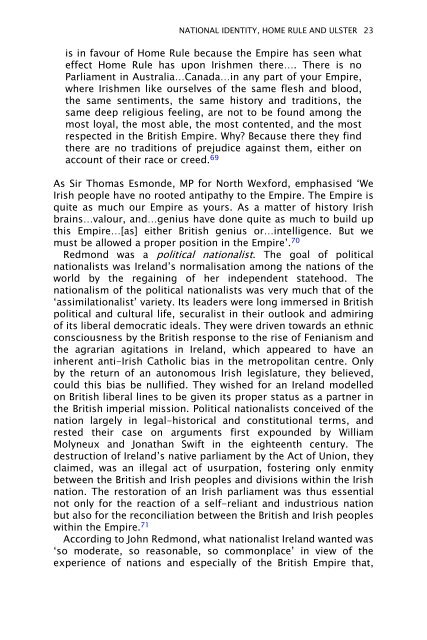Dividing Ireland: World War I and Partition
Dividing Ireland: World War I and Partition
Dividing Ireland: World War I and Partition
Create successful ePaper yourself
Turn your PDF publications into a flip-book with our unique Google optimized e-Paper software.
NATIONAL IDENTITY, HOME RULE AND ULSTER 23<br />
is in favour of Home Rule because the Empire has seen what<br />
effect Home Rule has upon Irishmen there…. There is no<br />
Parliament in Australia…Canada…in any part of your Empire,<br />
where Irishmen like ourselves of the same flesh <strong>and</strong> blood,<br />
the same sentiments, the same history <strong>and</strong> traditions, the<br />
same deep religious feeling, are not to be found among the<br />
most loyal, the most able, the most contented, <strong>and</strong> the most<br />
respected in the British Empire. Why? Because there they find<br />
there are no traditions of prejudice against them, either on<br />
account of their race or creed. 69<br />
As Sir Thomas Esmonde, MP for North Wexford, emphasised ‘We<br />
Irish people have no rooted antipathy to the Empire. The Empire is<br />
quite as much our Empire as yours. As a matter of history Irish<br />
brains…valour, <strong>and</strong>…genius have done quite as much to build up<br />
this Empire…[as] either British genius or…intelligence. But we<br />
must be allowed a proper position in the Empire’. 70<br />
Redmond was a political nationalist. The goal of political<br />
nationalists was <strong>Irel<strong>and</strong></strong>’s normalisation among the nations of the<br />
world by the regaining of her independent statehood. The<br />
nationalism of the political nationalists was very much that of the<br />
‘assimilationalist’ variety. Its leaders were long immersed in British<br />
political <strong>and</strong> cultural life, securalist in their outlook <strong>and</strong> admiring<br />
of its liberal democratic ideals. They were driven towards an ethnic<br />
consciousness by the British response to the rise of Fenianism <strong>and</strong><br />
the agrarian agitations in <strong>Irel<strong>and</strong></strong>, which appeared to have an<br />
inherent anti-Irish Catholic bias in the metropolitan centre. Only<br />
by the return of an autonomous Irish legislature, they believed,<br />
could this bias be nullified. They wished for an <strong>Irel<strong>and</strong></strong> modelled<br />
on British liberal lines to be given its proper status as a partner in<br />
the British imperial mission. Political nationalists conceived of the<br />
nation largely in legal-historical <strong>and</strong> constitutional terms, <strong>and</strong><br />
rested their case on arguments first expounded by William<br />
Molyneux <strong>and</strong> Jonathan Swift in the eighteenth century. The<br />
destruction of <strong>Irel<strong>and</strong></strong>’s native parliament by the Act of Union, they<br />
claimed, was an illegal act of usurpation, fostering only enmity<br />
between the British <strong>and</strong> Irish peoples <strong>and</strong> divisions within the Irish<br />
nation. The restoration of an Irish parliament was thus essential<br />
not only for the reaction of a self-reliant <strong>and</strong> industrious nation<br />
but also for the reconciliation between the British <strong>and</strong> Irish peoples<br />
within the Empire. 71<br />
According to John Redmond, what nationalist <strong>Irel<strong>and</strong></strong> wanted was<br />
‘so moderate, so reasonable, so commonplace’ in view of the<br />
experience of nations <strong>and</strong> especially of the British Empire that,








